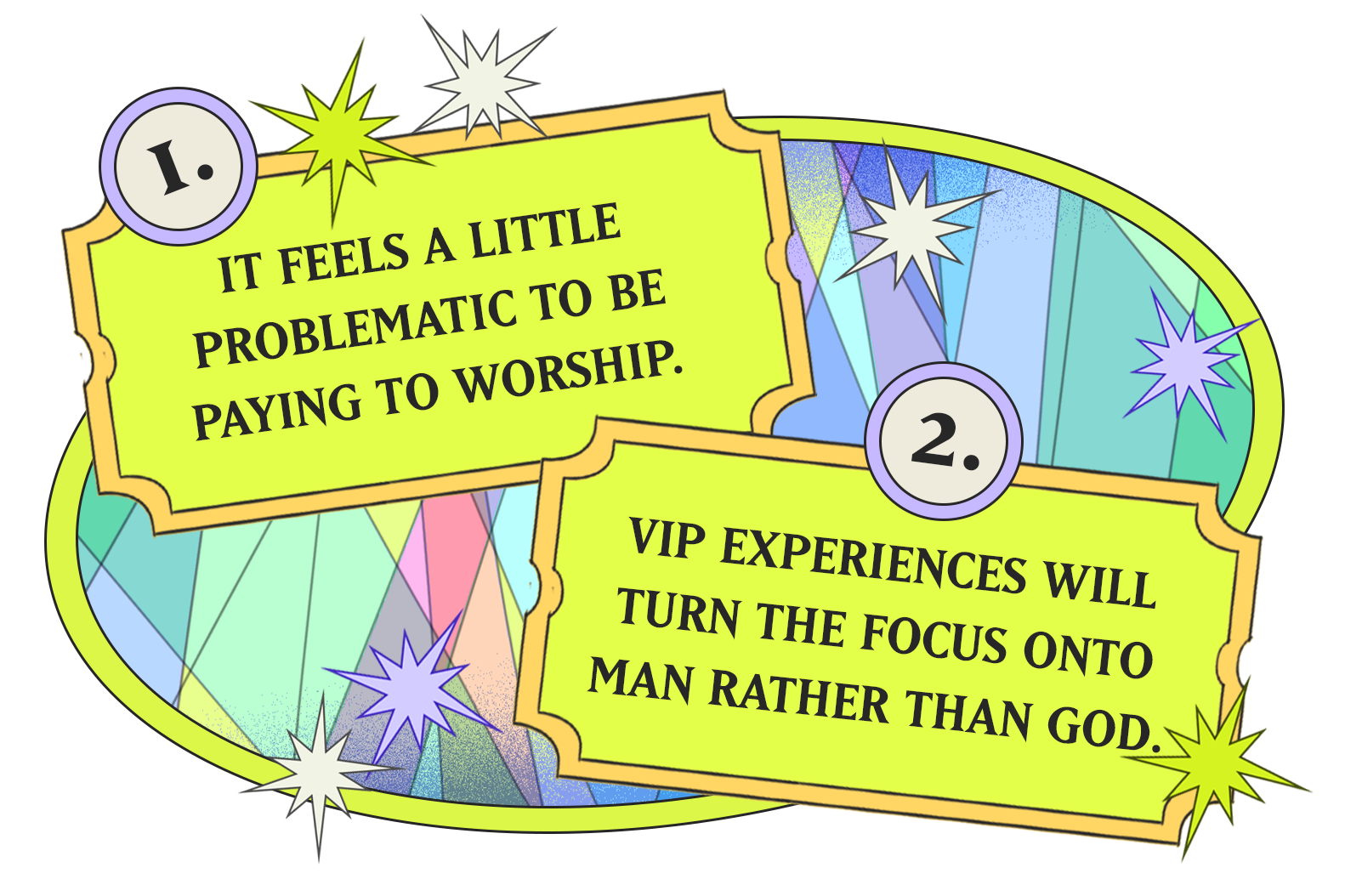Recent weeks have seen considerable furore in the Christian online space concerning the pricing strategies for Hillsong UNITED and Chris Tomlin’s upcoming concert.
Tickets for their upcoming US tour in 2022 had featured VIP experiences, which promised premium reserved seats, exclusive gifts, intimate pre-show artiste experiences and, most notably, photo opportunities on the on-stage catwalk.
As of October 21, however, these exclusive tickets have been rebranded on the official tour webpage as Experience Packages instead of VIP experiences.
Hillsong Church has not yet replied to my queries on the rationale behind organising these VIP experiences, so I reached out to some folks who might have some idea.
As someone who has brought Christian bands and artistes like Leeland, for KING & COUNTRY and Pat Barrett into the region, I began by asking Raphael Foo of Assembly Asia what the rationale of the VIP experience might be from his point of view.
WHAT’S THE DEAL WITH VIP?
In a season of preparation for Assembly Asia’s launch, Raphael, who is also a hedge fund portfolio manager, spent some five years travelling to festivals and concerts in locales such as the US, the UK and Australia.
His goal was to see how these events were organised to learn what could be brought over or done better in Asia.
In that time, he attended concert experiences similar to UNITED and Tomlin’s VIP offering, but found these formats did not work for Singapore’s context.
“I just felt that it doesn’t work for us,” he reflected. “But from a rational perspective, why (the VIP experience) might work is that 50 per cent of the concert costs are paid for by 10 per cent of the people.
“This allows you to artificially subsidise the remaining 90 per cent of the attendees.”

Raphael further raised a geographical sensitivity to consider: “In the US, they move from city to city quite quickly, so they identify this 10 per cent of people by giving them different unique worship experiences.”
In contrast, Raphael shared that, as a smaller nation, Singapore is blessed to have a local church that readily unites to bless the kingdom and support events for the gospel.
He has previously seen up to 70–80 per cent of event costs covered by the church community here.
This kind of financial support would not be common for bands from abroad, especially those from large countries, which go some way in explaining the need for different pricing categories.
It’s a point that Rend Collective frontman, Chris Llewellyn, has made in his article defending such pricing strategies. The Northern Irish musician stated outright that his band would not be able to tour without the financial support such ticket categories afford.

While Raphael didn’t exactly know what UNITED or Tomlin’s strategy was in this instance, he shared some insight into the inner workings of concert promotion.
Raphael also revealed that the artistes themselves often are not involved in many of these marketing decisions. Many simply come under an agreement to appear and perform, and have no input as to what kinds of ticket categories are being sold.
“If you work with a commercial company, then this commercial company would also have their own goals. They may want to reduce their own risk or maximise certain kinds of aims — like profit,” he elaborated.
On that note, Raphael shared that Assembly Asia is not a commercial concert promoter.
“We think of ourselves as a ministry and our entire goal is not profit, but service to the body of Christ,” he explained.
To that end, Assembly Asia’s pricing strategy (giving free tickets to pastors, for instance) is thus designed to achieve “certain outcomes for the Church”.
As part of their “skills transfer” strategy in the kingdom, Assembly Asia supports younger generations across Asia by creating opportunities for local and regional talent to learn from brothers and sisters at the forefront of Christian creative ministry.
THE NEED FOR GOOD STEWARDSHIP
While I was glad to have Raphael lay out some reasons and clear up some mechanics for me, I found that I still held on to two discomforting beliefs or feelings about modern worship.
- It feels a little problematic to be paying for/to worship.
- VIP experiences will turn the focus onto man rather than God.
My discomfort about this VIP experience package was all the more acute when I recalled that breaches of trust and moral failure were found in a Hillsong church barely a year ago.
To that, Raphael shared some things to keep in mind that would help with discernment in such matters.
“Do you trust that the money is used for the furtherance of God’s kingdom?”
Speaking about paying for worship, he said: “I think of it as an honorarium, a love gift to the artiste… I would think of it as an offering to the Lord. In that sense, the offering goes into defraying the cost of the event.”
I think I can get behind that, but I’d have to be very sure the people who receive the money are servants of God who will faithfully steward it for the gospel.
Raphael is likewise agreeable to paying for worship as an offering as long as the ministry receiving it is trustworthy.
He boiled it down to a question: “Do you trust that the money is used for the furtherance of God’s kingdom?”
Naturally, discernment is needed here. To Raphael, if a ministry is not stewarding their resources well and making extravagant purchases, then that should raise red flags.

Now, paying for worship is one thing. But paying for a VIP experience is something else.
As I’ve said, my view is that VIP experiences have a tendency to turn the focus onto man — the band, the artiste or perhaps even the audience — rather than God.
When this happens, it reflects the celebrity problem in modern worship (for that matter, even calling it modern worship suggests that something’s changed with worship) that some worship leaders like Tom Read have lambasted and lamented over.
I was glad to hear an alternative view from Raphael, who pointed out that VIP experiences don’t necessarily have to turn out that way. He believes that, done right, they can be platforms for God’s glory too.
Having attended such VIP experiences himself, Raphael believes they can provide precious encounters between artiste and audience: “I realised that when they speak to the artiste, they really relive the testimony of what the Lord has done for them.
“A lot of the interactions sounded like, ‘Through your music, God brought me through this time.’”
To Raphael, that is how such intimate sessions can make for wonderful testimonies and actually contribute to both parties’ (artiste and audience) relationship with the Lord.
If it’s organised and executed right, I’m inclined to agree. And that’s where I think Assembly Asia is on the right page with their take on meet-and-greet sessions (to be clear, these are not VIP experiences!).
A BETTER WAY TO THINK ABOUT VIP
Raphael affirmed that the goal behind organising such cosy sessions should be to channel conversations towards the glorification of Jesus Christ.
“I think the whole idea is to channel all this energy that people feel, all the feelings that people have towards the artiste, into a time that glorifies Jesus,” he clarified.
For example, Raphael shared that when for KING & COUNTRY was at FOPx, there was an open-mic session where anyone could share a “word of honour” to encourage the band in their service unto God or share testimonies of how God has moved in their lives through the band’s music.
“Some of them talked about how they were depressed, lonely, studying overseas, all sorts of things — but the music helped them; the anointing of Jesus in the music really supported them in a difficult time,” he recalled.
Rethink the VIP experience from very important person to very intentional proceeding.
Raphael also told me about a similar session organised when Pat Barrett was in Singapore, where a girl shared at length about how a song Barrett had written, “Good Good Father“, had helped her in a time when her father left the family.
From her sharing, Barrett was able to be encouraged that his ministry had helped someone discover who God is as a loving Abba Father.
Additionally, someone had, just this morning, sent him an article written by a person who encountered the reality of God through someone else’s testimony at that open-mic session with Barrett.
What came to mind as I heard all of this was the need to rethink the VIP experience from very important person to very intentional proceeding.
These anecdotes Raphael shared with me also showed me that executed rightly, worship events (free or not) can edify those in attendance and bring glory to God.
So, should worship concerts offer VIP experiences?
I think it’s a question we have to answer for ourselves. Personally, I’d boil that down to a few more questions to help my thinking:
- What actually goes on in the VIP experience?
- What is done with the money? Does it go towards subsidising fellow believers’ tickets or wrongful use?
- What are the character and track record of the band and the parties receiving my money?
- Is the gospel preached and God glorified?
At the end of the day, if a God-glorifying outcome can be achieved through my money or having a special type of event (no catwalk photos please, though!), I can get behind that.
But the VIP must always and only be God.
- What does it mean to glorify Him in worship? Conversely, how can we fail to keep our focus on God?
- Have you had the experience of being part of a live worship event? How was it like?
- What are your views on paying for worship and exclusive experiences?









